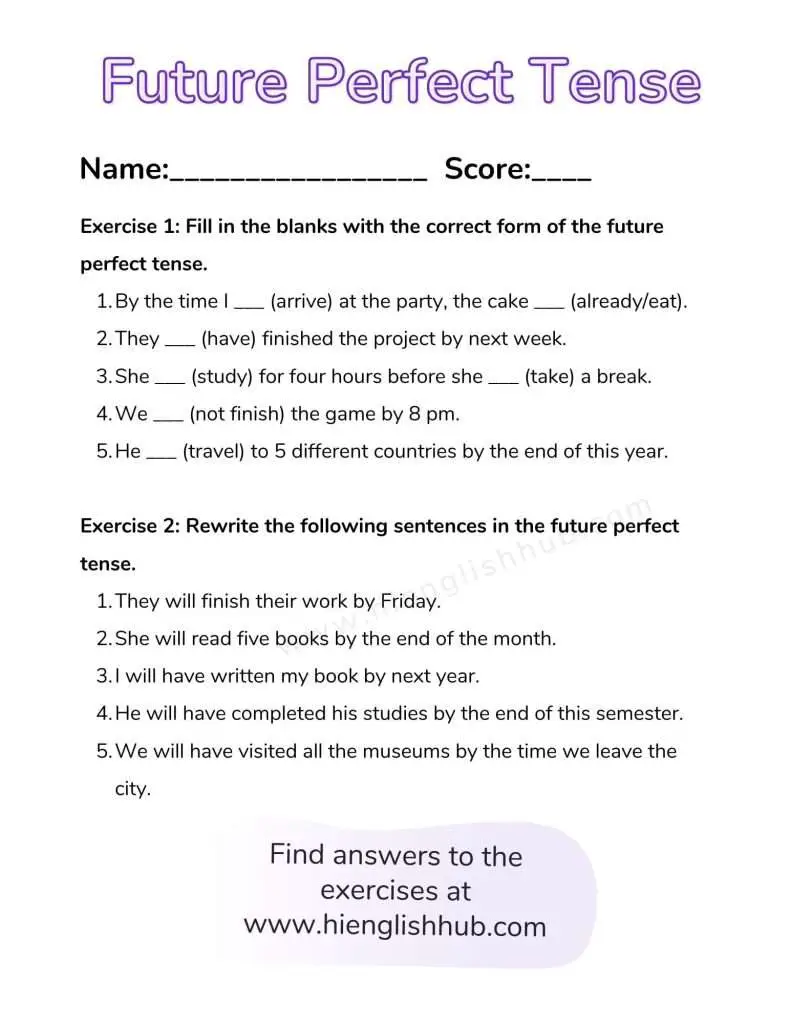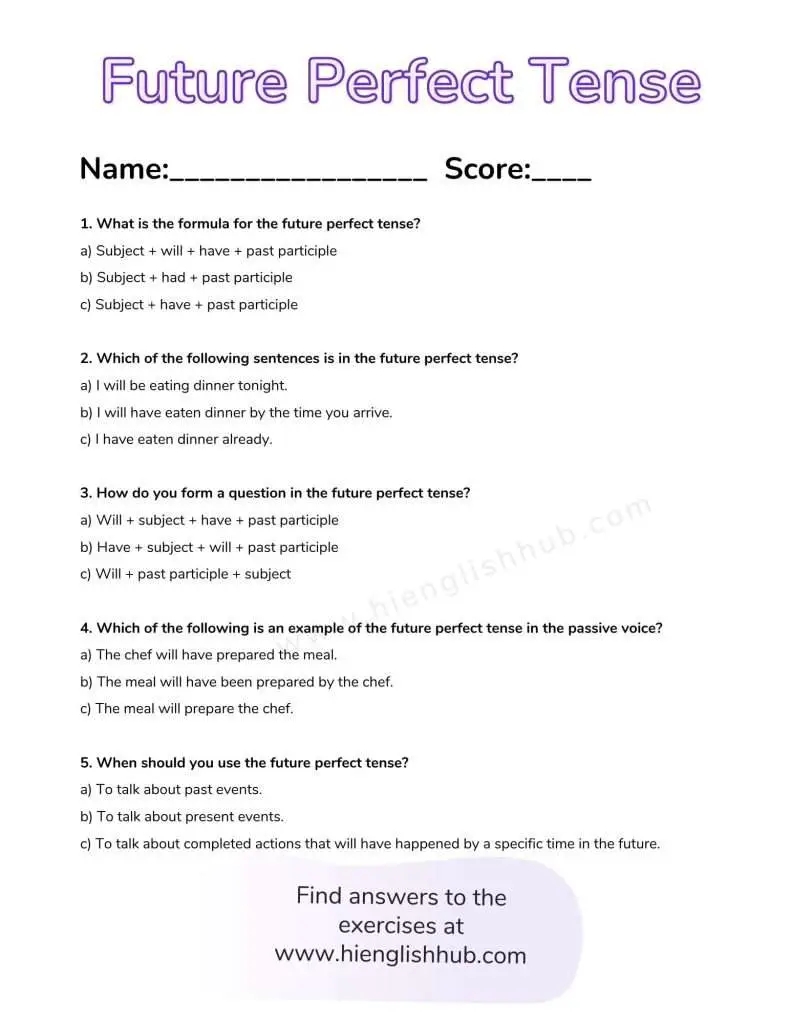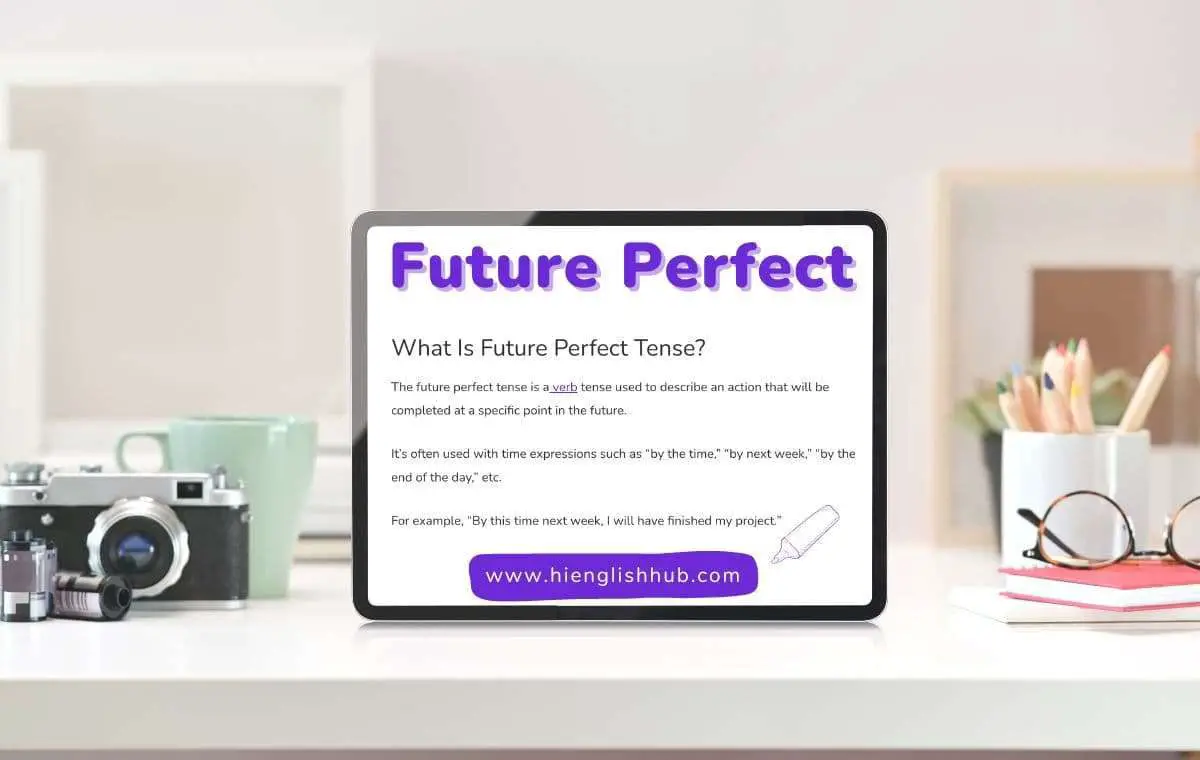Are you curious about what the future holds?
In English grammar, we have a special tense that allows us to talk about events that will have already happened at a specific time in the future.
It’s called the future perfect tense, and it can help us describe completed actions that haven’t happened yet.
So let’s get started and discover all the exciting possibilities that the future perfect tense has to offer!
Related posts:
What Is Future Perfect Tense?
The future perfect tense is a verb tense used to describe an action that will be completed at a specific point in the future.
It’s often used with time expressions such as “by the time,” “by next week,” “by the end of the day,” etc.
For example, “By this time next week, I will have finished my project.”
Future Perfect Tense Formula
The formula for the future perfect tense is quite simple.
Subject + will/shall + have + past participle of main verb
For example:
- I will have studied for three hours by the time my exam starts tomorrow.
- They will have finished the project by next week.
10 Examples Of Future Perfect Tense
Here are some examples of the future perfect tense in action:
- By the time I finish this book, I will have read 200 pages.
- In two weeks, I will have completed my training.
- By the end of the quarter, the company will have achieved its sales goals.
- After six months of training, she will have become a certified yoga teacher.
- By the time he gets here, I will have already left.
- In ten years, they will have paid off their mortgage.
- Before the end of the year, he will have received his promotion.
- After studying for three months, I will have learned a new language.
- By the time the guests arrive, we will have finished cooking dinner.
- By next summer, she will have visited all of the National Parks in the U.S.
How To Ask A Question With The Future Perfect Tense
To form a question in the future perfect tense, simply switch the subject and the auxiliary verb “will” or “shall.”
Here’s an example:
- Statement: By next year, I will have graduated from college.
- Question: Will you have graduated from college by next year?
Notice how we added “will” before the main verb “have graduated” and moved the subject “you” before the auxiliary verb “will.”
Future Perfect Tense Passive Voice
To use the future perfect tense in the passive voice, we start with the subject, followed by “will have been,” and then the past participle of the main verb.
| Active Voice | Passive Voice | |
|---|---|---|
| Form | Subject + will have + past participle | Subject + will have been + past participle |
| Example | The chef will have cooked the meal. | The meal will have been cooked by the chef. |
| They will have finished the project. | The project will have been finished by them. |
The subject becomes the receiver of the action, and the doer of the action is often placed in a prepositional phrase introduced by “by.”
Using the future perfect tense in the passive voice is a great way to emphasize the outcome of an action, particularly when the person or thing carrying out the action is unimportant or unknown.
Future Perfect Tense Exercises
Here are a few exercises to help you practice using the future perfect tense in context.

Exercise 1: Fill in the blanks with the correct form of the future perfect tense.
- By the time I ___ (arrive) at the party, the cake ___ (already/eat).
- They ___ (have) finished the project by next week.
- She ___ (study) for four hours before she ___ (take) a break.
- We ___ (not finish) the game by 8 pm.
- He ___ (travel) to 5 different countries by the end of this year.
Exercise 2: Rewrite the following sentences in the future perfect tense.
- They will finish their work by Friday.
- She will read five books by the end of the month.
- I will have written my book by next year.
- He will have completed his studies by the end of this semester.
- We will have visited all the museums by the time we leave the city.
Answers:
Exercise 1:
- arrive, will have already been eaten
- will have finished
- will have studied, takes
- will not have finished
- will have traveled
Exercise 2:
- They will have finished their work by Friday.
- She will have read five books by the end of the month.
- I will have written my book by next year.
- He will have completed his studies by the end of this semester.
- We will have visited all the museums by the time we leave the city.
Future Perfect Tense Quiz
Are you ready to test your knowledge of the future perfect tense?
Take this short quiz to see how well you understand the structure and usage of this important English verb tense.
Don’t worry if you’re not sure of all the answers—the quiz is designed to help you learn and improve your skills.
Let’s get started!

1. What is the formula for the future perfect tense?
a) Subject + will + have + past participle
b) Subject + had + past participle
c) Subject + have + past participle
2. Which of the following sentences is in the future perfect tense?
a) I will be eating dinner tonight.
b) I will have eaten dinner by the time you arrive.
c) I have eaten dinner already.
3. How do you form a question in the future perfect tense?
a) Will + subject + have + past participle
b) Have + subject + will + past participle
c) Will + past participle + subject
4. Which of the following is an example of the future perfect tense in the passive voice?
a) The chef will have prepared the meal.
b) The meal will have been prepared by the chef.
c) The meal will prepare the chef.
5. When should you use the future perfect tense?
a) To talk about past events.
b) To talk about present events.
c) To talk about completed actions that will have happened by a specific time in the future.
Answers:
1) a, 2) b, 3) a, 4) b, 5) c
Wrapping Up
That’s it for our discussion on the future perfect tense!
Now that you know how to use the future perfect tense, the key to mastering it is practice.
Don’t be afraid to use it in your writing and speaking; try to incorporate it into your daily English conversations.
The more you practice, the more comfortable and confident you’ll become.
If you found this post helpful, please consider sharing it with your friends or classmates who may also be learning English.
And don’t forget to follow Hi English Hub on Pinterest and Twitter for more helpful tips and resources on English grammar.
Happy learning!


